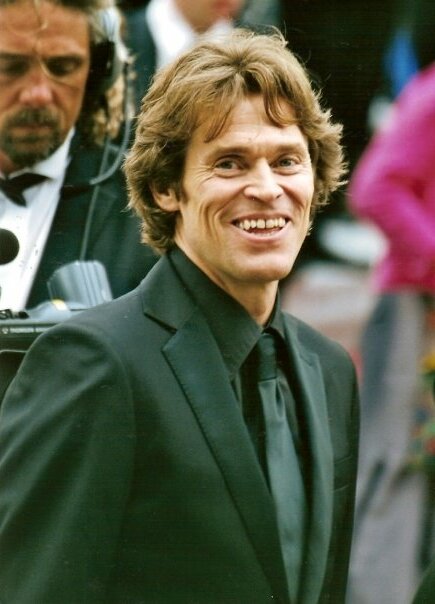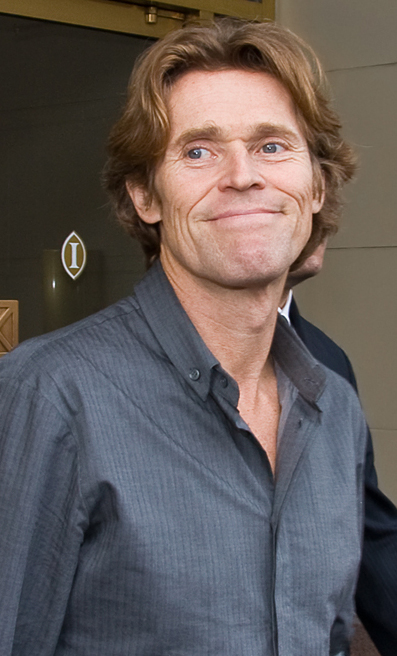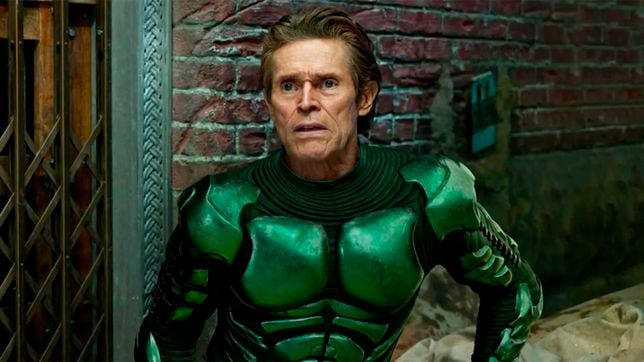Willem Dafoe
Willem Dafoe

Willem Dafoe, born on July 22, 1955, in Appleton, Wisconsin, is a highly acclaimed American actor known for his versatile and often intense performances. Throughout his career, he has received numerous awards and nominations, including four Academy Award nominations and recognition at prestigious film festivals.
Dafoe's career began in experimental theater, where he was a founding member of The Wooster Group. He transitioned to film with his debut in "Heaven's Gate" in 1980, although he was fired during production. Despite this setback, he continued to build his reputation with roles in films like "The Loveless" (1982), "Streets of Fire" (1984), and "To Live and Die in L.A." (1985).
He gained widespread acclaim for his performances in "Platoon" (1986), which earned him his first Academy Award nomination, and "Shadow of the Vampire" (2000). Dafoe's range became evident as he portrayed Jesus Christ in "The Last Temptation of Christ" (1988) and FBI agent Alan Ward in "Mississippi Burning" (1988).
Dafoe's filmography is characterized by diverse roles across various genres, including dramas like "The English Patient" (1996), thrillers like "Clear and Present Danger" (1994), and animated films like "Finding Nemo" (2003). He has also collaborated with acclaimed directors such as Lars von Trier, Wes Anderson, and Robert Eggers.
In addition to his film work, Dafoe gained significant recognition for his portrayal of the supervillain Norman Osborn / Green Goblin in Sam Raimi's "Spider-Man" trilogy (2002-2007) and its recent continuation in "Spider-Man: No Way Home" (2021). He also appeared in the DC Extended Universe as Nuidis Vulko in "Aquaman" (2018) and "Zack Snyder's Justice League" (2021).
In recent years, Dafoe has continued to impress audiences and critics with roles in acclaimed films like "The Florida Project" (2017), "The Lighthouse" (2019), "The French Dispatch" (2021), and "Nightmare Alley" (2021). He remains a respected and influential figure in the world of cinema, known for his dedication to his craft and his ability to inhabit a wide range of characters with depth and authenticity.

Willem Dafoe, born William James Dafoe on July 22, 1955, in Appleton, Wisconsin, was raised by his five sisters due to his parents' demanding professions in medicine. His father, Dr. William Alfred Dafoe, was a surgeon, and his mother, Muriel Isabel Dafoe, was a nurse. Dafoe's family background influenced his upbringing, with his brother Donald also pursuing a career in medicine as a surgeon and research scientist.
During his high school years, Dafoe acquired the nickname Willem, the Dutch version of William, which he later adopted as his stage name. He attended Appleton East High School before pursuing drama studies at the University of Wisconsin–Milwaukee. However, he left after 18 months to join the experimental theater company Theatre X in Milwaukee.
In 1976, Dafoe relocated to New York City, where he further honed his acting skills under the mentorship of Richard Schechner, the director of The Performance Group, an avant-garde theater troupe. It was during this time that he met director Elizabeth LeCompte, with whom he became romantically involved. Following internal conflicts within The Performance Group, Dafoe and other members, including LeCompte, formed their own theater company, The Wooster Group, with Dafoe being credited as one of its co-founders.
Despite establishing himself as a prominent Hollywood actor, Dafoe remained committed to his work with The Wooster Group, continuing his involvement well into the 2000s. His early experiences in experimental theater laid the foundation for his versatile and boundary-pushing approach to acting, which would later define his acclaimed film career.
Willem Dafoe's early film career saw him in a variety of roles, showcasing his versatility and talent. He made his film debut in a supporting role in Michael Cimino's 1980 epic Western film "Heaven's Gate." Despite being present for only the first three months of the eight-month shoot, his role as a cockfighter was largely edited out of the final film, with only a brief appearance remaining during a cockfight scene. Despite this, Dafoe's work went uncredited.
In 1982, Dafoe had his first leading role in the drama "The Loveless," where he portrayed the leader of an outlaw motorcycle club. Co-directed by Kathryn Bigelow and Monty Montgomery, the film paid homage to Marlon Brando's iconic role in "The Wild One."
Dafoe's career continued to flourish with notable roles in films such as Walter Hill's 1984 action film "Streets of Fire," where he played the main antagonist, the leader of a biker gang. His portrayal received praise, with critics highlighting his perfectly villainous demeanor.
He also starred in "Roadhouse 66" (1985), alongside Judge Reinhold, playing one of two yuppies stranded in a town on U.S. Route 66. Later in 1985, he delivered a strong performance as a counterfeiter named Rick Masters in William Friedkin's thriller "To Live and Die in L.A.," earning acclaim from critics such as Roger Ebert.
Dafoe's early roles demonstrated his ability to inhabit a diverse range of characters and set the stage for his future success in the film industry.
Willem Dafoe's career continued to thrive in the late 1980s and early 1990s with a series of diverse and memorable roles.
In 1986, Dafoe gained widespread recognition for his role as Sergeant Elias Grodin in Oliver Stone's Vietnam War film "Platoon." His portrayal of the compassionate sergeant earned him critical acclaim and his first Academy Award nomination for Best Supporting Actor. Despite not winning the award, his performance showcased his versatility and established him as a formidable talent in Hollywood.
The following year, Dafoe provided his voice to the documentary "Dear America: Letters Home from Vietnam" and starred as Criminal Investigation Command Agent Buck McGriff in the action thriller "Off Limits," set during the Vietnam War. He further solidified his reputation with his portrayal of Jesus in Martin Scorsese's controversial epic drama "The Last Temptation of Christ" (1988), earning praise for his intense and nuanced performance.
Dafoe's versatility was evident in his role as FBI agent Alan Ward in the crime thriller "Mississippi Burning" (1988), where he investigated the disappearance of civil rights workers during the 1960s. Despite controversy surrounding the film's fictionalization of events, Dafoe's performance was widely praised.
In the late 1980s and early 1990s, Dafoe continued to deliver compelling performances in a variety of genres. He appeared in "Triumph of the Spirit" (1989), portraying Jewish Greek boxer Salamo Arouch, and reunited with Oliver Stone for a small role in "Born on the Fourth of July" (1989).
Dafoe's ability to inhabit complex characters was showcased in films such as "Wild at Heart" (1990), directed by David Lynch, and "Flight of the Intruder" (1991), an action film co-starring Danny Glover. He also had lead roles in films like "White Sands" (1992) and "Light Sleeper" (1992), demonstrating his range as an actor.
Throughout the 1990s, Dafoe continued to tackle diverse roles, including a sadomasochistic lawyer in "Body of Evidence" (1993) opposite Madonna, and a CIA agent in "Clear and Present Danger" (1994) alongside Harrison Ford. He also portrayed poet T.S. Eliot in "Tom & Viv" (1994) and appeared in the romantic war drama "The English Patient" (1996).
Overall, Dafoe's work during this period cemented his reputation as one of the most talented and versatile actors in Hollywood, capable of delivering powerful performances across a wide range of genres and characters.
References
- Archived at Ghostarchive and the Wayback Machine: Willem Dafoe Pronounced His Name Wrong – CONAN on TBS, retrieved January 7, 2020
- ^ "Willem Dafoe got fired from his first film role for lying about speaking Dutch". The A.V. Club. November 6, 2019. Retrieved June 30, 2023.
- ^ "William James Dafoe". Ancestry. Archived from the original on March 27, 2019. Retrieved November 11, 2017.
- ^ Marx, Rebecca Flint (2007). "Willem Dafoe". Movies & TV Dept. The New York Times. Archived from the original on October 23, 2007.
- ^ "Willem Dafoe". Encyclopædia Britannica. Retrieved January 19, 2014.
- ^ Riley, Sarah (June 30, 2014). "Willem Dafoe knocks Appleton — again". Post Crescent. Appleton WI. Retrieved June 19, 2019.
- ^ "William Dafoe's Obituary on Appleton Post-Crescent". Appleton Post-Crescent.















































